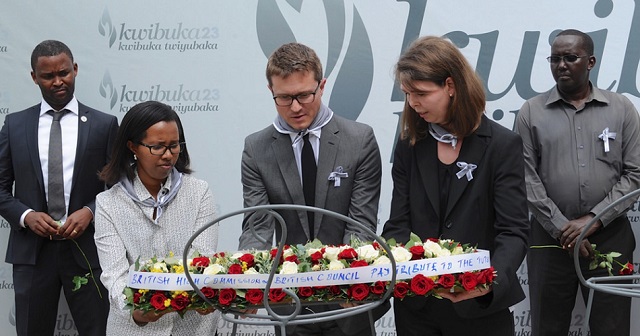
Kampala, Uganda | FRANCIS BYARUHANGA | With one month left for Rwanda to commemorate 24 years since the 1994 genocide against the Tutsi, the United Nations General Assembly has unanimously adopted a decision on the “International Day of Reflection on the 1994 Genocide against the Tutsi in Rwanda”. The decision corrects inaccuracies that existed in the previous resolution, A/RES/58/234, which omitted to name the Tutsi as the group targeted for extermination.
The General Assembly designated April 7, as the International Day of Reflection on the 1994 Genocide against the Tutsi in Rwanda and adopted the resolution that corrects the terming of 1994 Genocide in Rwanda and replaced it with the “Genocide against the Tutsi”. This is in recognition that defining genocide without explicit reference to whom it was committed against falls short of the true meaning of the genocide definition with expansive interpretation.
This was during the 77th plenary meeting of the UN General Assembly on sport for development and peace, and on causes of conflict and promotion of durable peace and sustainable development in Africa last on February 09 at UN Headquarters New York.
Amb. Valentine Rugwabiza, Rwanda’s Permanent Representative to the UN, while presenting the draft addressed the International community that the decision aimed to correct historical inaccuracies contained in the previous resolution adopted 14 years ago.
She stressed that the unanimous adoption of the decision by the UN General Assembly, is a strong statement that the UN will not be a platform for genocide denial and revisionism.
Amb. Rugwabiza further stressed that the present decision on the International Day of Reflection on the 1994 Genocide against the Tutsi in Rwanda, is a tribute to the inalienable dignity of the victims, and the courage and resilience of the survivors of the 1994 Genocide against the Tutsi.
She said: “The text captures the historical facts of what happened in 1994, which is a ‘Genocide against the Tutsi in Rwanda’ and leaves no room for ambiguity.”
Historical accuracy and words are vital while referring to the Genocide, she said.
“The tactics of Genocide denial and revisionism are well known and documented. Some people, mostly those who were involved by action or omission, promote the theory of double Genocide in the futile belief that such suggestion might divert their own responsibility,” she noted.
According to Amb. Rugwabiza, the day of reflection “offers us as members of the international community” an opportunity to consider the factors that lead to such mass atrocity and “renew our collective pledge” of “never again”.
She said that it serves as an educative opportunity for future generations to equip them in fighting all forms of hate and Genocide ideology.
More importantly, she said, in these worrying times where we witness increase in expressions of divisionism, extremism and hatred in many parts of the world, it sends a clear message that the United Nations is a platform for the promotion and protection of human dignity of all people and will not serve as a platform for any form of Genocide denial or revisionism.
Speaking on behalf of the African Group, one of the five regional groups in the UN, Amb Anatolio Ndong Mba, Permanent Representative of Equatorial Guinea to the UN, said they welcome the adoption by consensus of the draft decision.
Amb. Mba said it was the least they could do to honour the memory of the children, women and men brutally murdered 24 years ago and to remember all the victims of “this tragic and dark chapter of our history.”
“At this moment, we stand with the Rwandan people and salute the huge strides they have made to recover from that unspeakable event to shape a bright future for the country,” the diplomat said.
Genocide by Definition
By the definition Genocide is causing serious bodily or mental harm to members of the group; deliberately inflicting on the group conditions of life calculated to bring about its physical destruction in whole or in part; imposing measures intended to prevent births within the group; and forcibly transferring children of the group to another group.
The word genocide came way back in 1944, thanks to a Polish-Jewish lawyer called Raphael Lemkin. He sought to create a new term to describe Nazi policies of the systematic murder of Jewish people. Lemkin used the ancient Greek word genos (race, tribe) and the Latin cide (killing) to come up with the new word, “genocide.”
Raphael Lemkin spent 4 years pushing for genocide to be added to international law. Ultimately, in 1948, the United Nations Convention on the Prevention and Punishment of Genocide was adopted, and it entered into force in 1951.
The Convention defined genocide in legal terms based on Lemkin’s work, and is the basis for genocide prevention efforts today.
The convention also further defines it as a crime against all of humankind, its harm being felt not only by the group targeted for destruction, but by all of humanity. There it’s imprescriptible, with no time limit, and it can be punishable at all times as long as the wrong doer still exists.
 The Independent Uganda: You get the Truth we Pay the Price
The Independent Uganda: You get the Truth we Pay the Price


